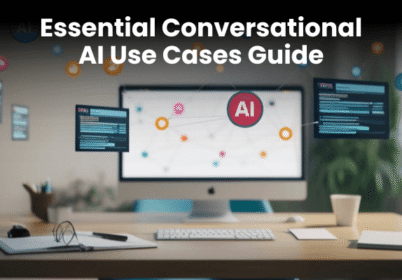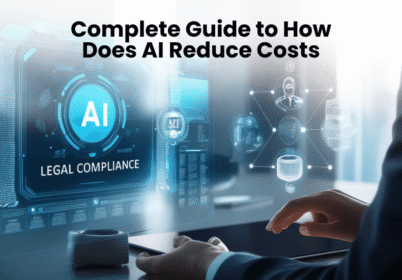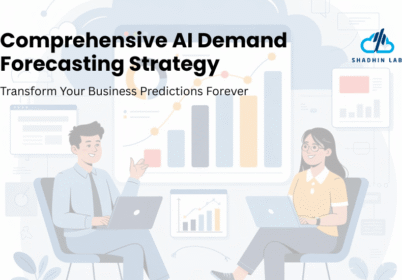Cost of AI in Healthcare: A Detailed Guide for 2025
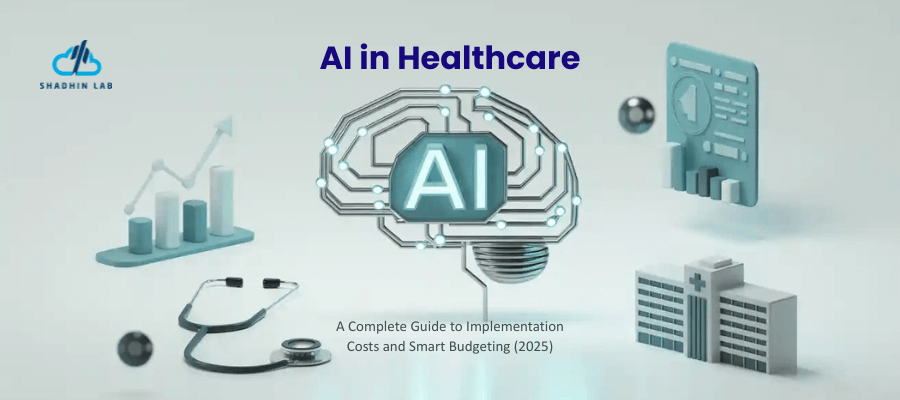
Table of Contents
Are you a healthcare professional feeling overwhelmed by the prospect of implementing AI in your organization? The financial aspects of AI adoption often create significant anxiety for healthcare leaders like you, especially when balancing innovation with budget constraints.
By the end of this comprehensive guide, you will understand what AI implementation actually costs in healthcare settings. You will gain insights to make smart decisions that align with your organization’s needs and financial reality. The cost of implementing AI in healthcare varies widely, but this guide provides the clarity you need.
Artificial Intelligence is transforming patient care, diagnostics, hospital operations, and medical research at an unprecedented pace. From AI-powered imaging tools to predictive analytics and automated administrative processes, healthcare providers are investing heavily in smart solutions to improve efficiency and outcomes. However, without a clear understanding of costs, many organizations risk overspending or delaying adoption altogether.
主なポイント:
- You will understand the essential costs of implementing AI in healthcare and how they impact your budget.
- Identify why healthcare organizations are rapidly investing in AI and the financial benefits it delivers.
- Explore the main factors that influence AI implementation costs in different healthcare settings.
- Break down pre-implementation, development, and post-implementation expenses with real cost ranges.
- Compare the estimated investment required for chatbots, predictive analytics, imaging AI, and full-scale hospital integration.
- Recognize the hidden costs often overlooked in healthcare AI projects.
- Apply proven strategies to reduce AI implementation expenses without sacrificing quality.
- Learn about different pricing models—SaaS, custom development, and hybrid approaches—and their implications.
- Discover how specialized vendors like Shadhin Lab can support cost-effective and compliant AI adoption.
- Prepare your organization to implement AI strategically while maximizing return on investment.
Table of Contents
Why Healthcare Organizations are Investing in AI
Have you wondered why so many healthcare facilities are rushing to implement AI despite the significant investment required? The driving force is addressing the very challenges you face every day in your healthcare role.
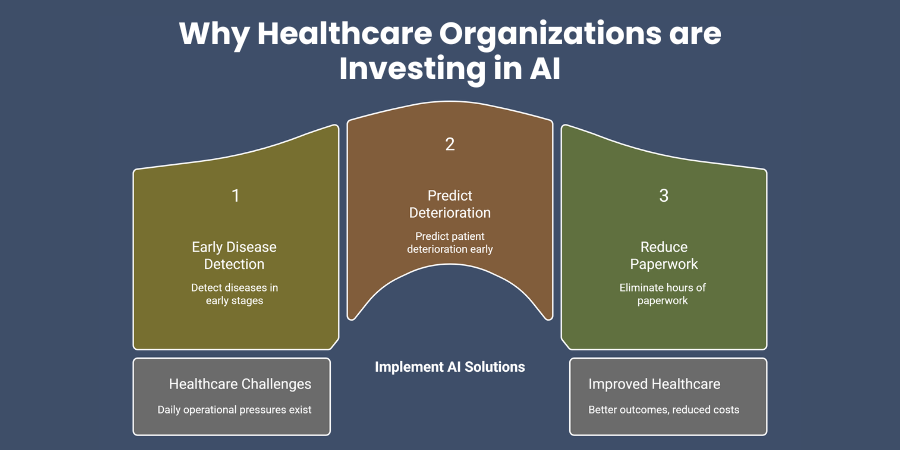
When you examine your daily operations, where do you feel the most pressure? AI solutions are being adopted precisely because they target these pain points that affect your work and patient experiences.
For you and your organization, AI represents an opportunity to simultaneously improve patient outcomes while reducing operational costs. Imagine detecting diseases earlier, predicting patient deterioration before clinical signs appear, or eliminating hours of paperwork from your schedule.
The financial motivation becomes clear when you consider that for every dollar invested in healthcare AI, studies show potential returns of $2-$5 through improved efficiency and better resource allocation. The organizations seeing the greatest returns approach implementation strategically rather than impulsively.
Key Factors Influencing the Cost of AI Implementation in Healthcare
Are you trying to figure out why AI implementation quotes vary so dramatically from one healthcare organization to another? The price differences reflect specific factors that directly impact what you will ultimately pay.
Your data situation significantly affects your costs. Data collection, cleaning, and labeling can represent up to 60% of your total AI implementation budget. Your existing data infrastructure will either be your greatest asset or your most expensive challenge.
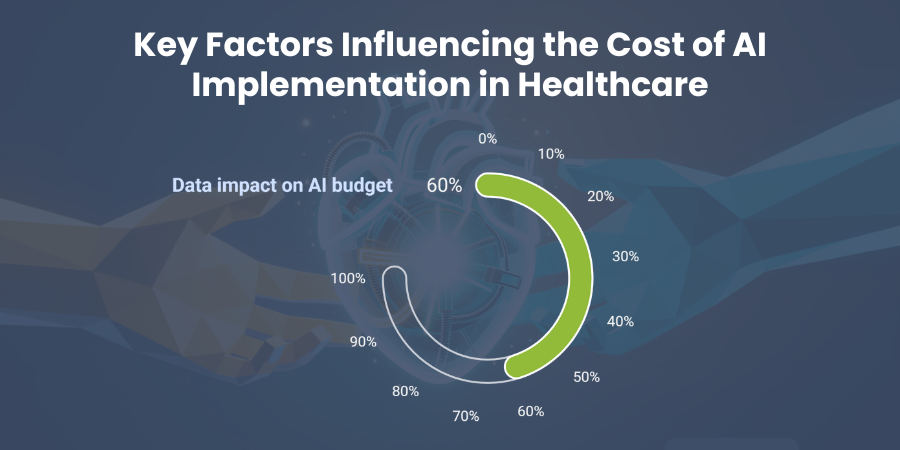
Have you considered how the specific type of AI solution influences your investment? An AI chatbot for patient scheduling might cost between $25,000-$75,000, while a diagnostic imaging AI system could require $200,000-$500,000 or more.
The age and compatibility of your existing systems dramatically affect integration costs. If you are working with legacy systems, you might face integration expenses that exceed the cost of the AI solution itself.
Regulatory compliance represents another critical cost factor. Healthcare AI must meet stringent HIPAA requirements, adding 15-30% to implementation costs compared to non-healthcare AI applications.
The level of customization you require will significantly impact your budget as well. Each customization increases your costs but may be essential for your particular situation.
Finally, developer expertise and location dramatically influence your expenses. A specialized healthcare AI team with regulatory experience commands premium rates but might save you money by avoiding costly compliance mistakes.
Breakdown of AI Implementation Costs in Healthcare
Have you ever wondered exactly where your money goes when implementing an AI solution in your healthcare facility? Understanding the cost breakdown helps you plan more effectively and avoid budget surprises.
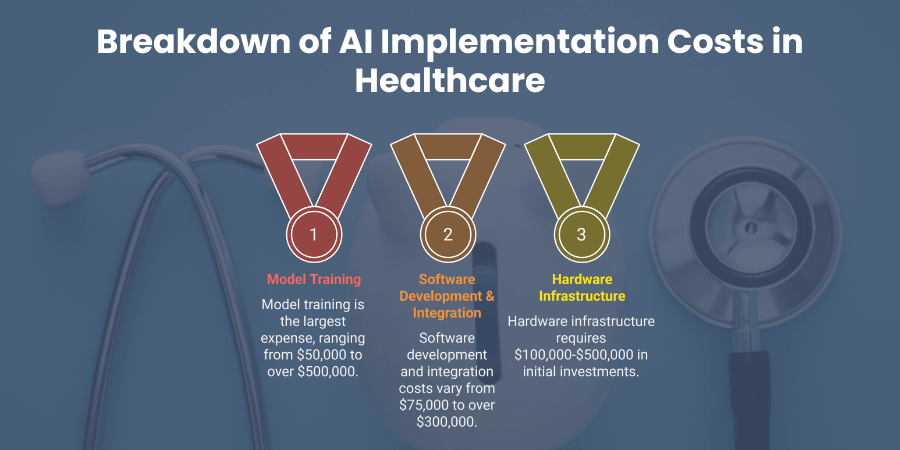
Pre-Implementation Costs
Before you write a single line of code or select a vendor, you face significant expenses. Comprehensive feasibility studies typically cost between $15,000-$50,000 depending on your organization’s size and complexity.
Pilot programs represent another crucial pre-implementation expense. These small-scale tests help validate AI concepts before full deployment and typically range from $50,000-$150,000.
Your regulatory assessment costs are another pre-implementation expense. Legal reviews to ensure HIPAA compliance typically add $10,000-$30,000 to your initial expenses.
Development Costs
Model training represents one of your largest expenses, with costs ranging from $50,000 for simpler applications to over $500,000 for complex diagnostic systems.
Software development and integration expenses vary dramatically based on your existing systems. Your integration costs could range from $75,000 to over $300,000 depending on your technical starting point.
Have you considered the hardware infrastructure requirements? On-premise solutions might require $100,000-$500,000 in initial hardware investments but could save money long-term depending on usage patterns.
Post-Implementation Costs
Staff training represents an ongoing expense many healthcare organizations underestimate. Comprehensive training programs typically cost $1,000-$3,000 per staff member.
System upgrades and maintenance will consume 15-25% of your initial implementation cost annually. Without proper maintenance, your AI system will quickly become outdated or potentially dangerous for patient care.
Compliance monitoring represents another ongoing expense unique to healthcare AI. Regular audits to maintain regulatory compliance typically cost $30,000-$100,000 annually depending on your system’s complexity.
Estimated Cost Range for AI in Healthcare in 2025
Are you trying to create a realistic budget for your AI healthcare initiative? Let me break down the current market ranges so you can plan with confidence.
AI Chatbots for Patient Support
If you are considering implementing an AI chatbot, you are looking at an investment range of $50,000-$200,000 for development and implementation.
For a basic symptom checker and appointment scheduler, you might spend closer to $50,000-$75,000. However, if you need a sophisticated chatbot that can access patient records, your investment could reach $150,000-$200,000.
Predictive Analytics for Population Health
These systems typically range from $200,000-$600,000 depending on the scope and data sources involved.
A basic system analyzing your existing patient data might cost closer to $200,000, while comprehensive solutions that incorporate social determinants of health could exceed $500,000.
Medical Imaging AI Solutions
If you are exploring AI for radiology or pathology, prepare for a significant investment. These specialized systems typically range from $300,000-$900,000 depending on the imaging modalities covered.
A single-purpose system focused on one condition might cost $300,000-$400,000, while comprehensive platforms covering multiple conditions could approach $900,000.
End-to-End Hospital AI Integration
Full-scale hospital AI integration typically ranges from $1 million to $5 million depending on your facility size, existing infrastructure, and implementation scope.
For a 100-bed community hospital with relatively modern systems, you might invest closer to $1-2 million. For a 500+ bed academic medical center, your investment could reach $4-5 million.
| AI Solution Type | Small Healthcare Organization | Medium Healthcare Organization | Large Healthcare Organization |
| AI Chatbots | $50,000-$75,000 | $75,000-$150,000 | $150,000-$200,000 |
| 予測分析 | $200,000-$300,000 | $300,000-$450,000 | $450,000-$600,000 |
| Medical Imaging AI | $300,000-$500,000 | $500,000-$700,000 | $700,000-$900,000 |
| End-to-End Integration | $1M-$2M | $2M-$3.5M | $3.5M-$5M |
Hidden Costs in Healthcare AI Projects
Have you ever started a technology project only to discover unexpected expenses? AI implementation in healthcare is particularly prone to hidden costs that can catch you off guard.
Cloud hosting expenses often surprise healthcare organizations transitioning from on-premise solutions. Your expenses typically grow 20-30% annually as your data volume and processing needs increase.
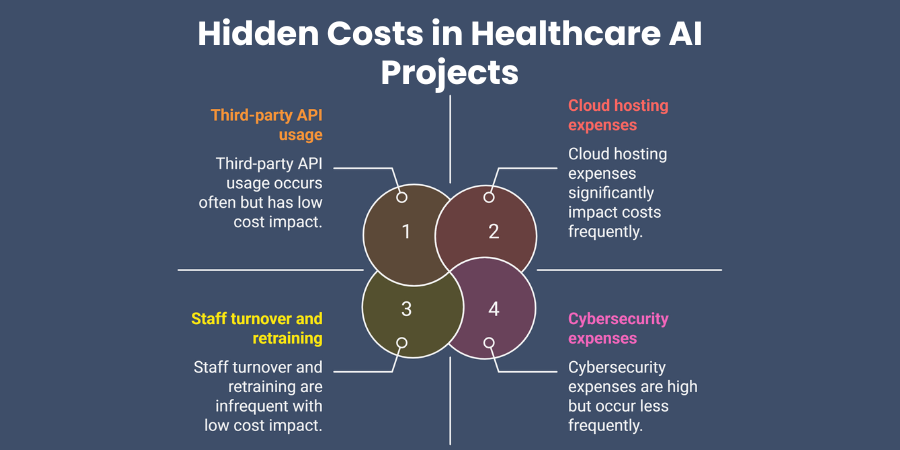
Third-party API usage represents another commonly overlooked expense. Each connection typically incurs per-transaction fees that can quickly accumulate to thousands of dollars monthly.
What about cybersecurity expenses? Healthcare AI systems require sophisticated security measures beyond standard IT protections. These specialized security solutions typically add 10-15% to your implementation costs.
Continuous monitoring costs often surprise healthcare organizations implementing their first AI systems. These monitoring systems typically cost $30,000-$100,000 annually depending on your AI application complexity.
Data storage requirements represent another expanding cost center. Medical imaging AI can generate terabytes of processed data that must be securely stored and remain accessible.
Staff turnover and retraining create additional hidden expenses. Healthcare organizations typically spend $5,000-$10,000 per new technical staff member on AI-specific training.
How to Reduce the Cost of AI Implementation in Healthcare
Are you worried about the substantial investment required for AI implementation? There are proven strategies you can use to significantly reduce your implementation costs without compromising quality.
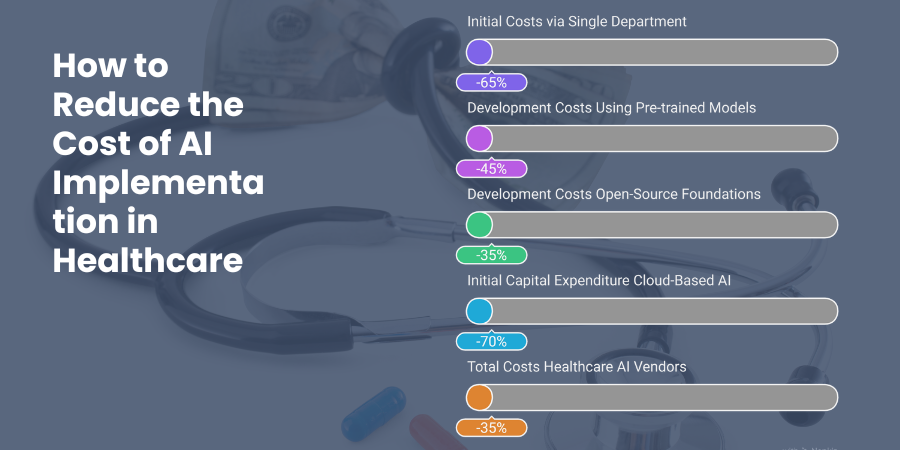
Have you considered starting with small-scale pilot projects instead of facility-wide implementation? By focusing on a single department, you can reduce initial costs by 60-70% while still demonstrating value.
What about leveraging pre-trained models instead of building custom AI from scratch? Using existing models as your foundation can reduce development costs by 40-50%.
Open-source frameworks offer another significant cost-saving opportunity. Healthcare organizations using open-source foundations typically save 30-40% on development costs compared to proprietary solutions.
Have you explored partnerships with academic institutions? Many universities seek healthcare partners for AI research, offering access to expertise at reduced costs.
Cloud-based AI services present another cost-reduction strategy. Pay-as-you-go models eliminate large upfront infrastructure investments, reducing your initial capital expenditure by 60-80%.
What about outsourcing to specialized healthcare AI vendors? Their efficiency and experience often result in 30-40% lower total costs compared to building internal capabilities from scratch.
Tip: Create a proof-of-concept with a single, high-value use case before committing to broader implementation. This approach reduces your financial risk and builds organizational confidence.
AI Implementation Pricing Models
Have you found yourself confused by the different pricing structures vendors offer for healthcare AI solutions? Understanding these models helps you select the approach that best fits your financial situation.
Subscription-Based SaaS Models
Are you looking for predictable ongoing costs with minimal upfront investment? Subscription-based SaaS models typically charge $500-$5,000 monthly depending on your organization size and usage volume.
The advantages include automatic updates, technical support, and the ability to scale up or down as your needs change. However, you sacrifice some customization options.
One-Time Custom Development
Do you need a highly specialized AI solution tailored to your unique clinical workflows? One-time custom development typically costs $200,000-$1,000,000+ depending on complexity but gives you complete ownership.
This approach offers maximum customization and control but requires significant upfront capital. You also assume responsibility for ongoing maintenance and updates.
Hybrid Approaches
Would a combination of approaches work better for your situation? Many healthcare organizations find that hybrid models offer the best balance.
Hybrid approaches typically reduce your initial investment by 30-50% compared to fully custom solutions while providing more flexibility than pure SaaS options.
| Pricing Model | Initial Investment | Ongoing Costs | 最適用途 | Key Considerations |
| SaaS Subscription | $10,000-$50,000 | $500-$5,000/month | Organizations seeking predictable costs | Limited customization, faster implementation |
| Custom Development | $200,000-$1,000,000+ | 15-25% of initial cost annually | Organizations with unique workflows | Maximum control, higher initial investment |
| Hybrid Approach | $100,000-$300,000 | Varies based on components | Mid-sized organizations with some unique needs | Balance of customization and cost |
How Shadhin Lab Can Help
Are you feeling overwhelmed by the complexity of implementing AI in your healthcare organization? Navigating the technical, financial, and regulatory aspects requires specialized expertise.
Shadhin Lab understands your specific challenges as a healthcare provider considering AI implementation. Our team specializes in healthcare AI with a focus on cost-effective implementation strategies.
Have you struggled to get clear cost estimates from other vendors? Shadhin Lab provides transparent pricing models with detailed breakdowns of all implementation phases.
What about regulatory compliance? Our implementation team includes healthcare compliance specialists who ensure your AI solutions meet all HIPAA requirements and other relevant regulations.
Are you concerned about maximizing your return on investment? Shadhin Lab begins every engagement with a thorough ROI analysis, identifying the specific AI applications that will deliver the greatest value.
Our phased implementation methodology allows you to start with smaller, high-impact projects that demonstrate value quickly while minimizing initial investment.
結論結論
You now have a comprehensive understanding of the cost of implementing AI in healthcare and the factors that influence your specific investment. While the numbers might seem daunting, remember that AI implementation is a strategic investment in your organization’s future capabilities.
Have you considered how your approach to AI implementation might evolve based on what you have learned? Perhaps starting with a focused pilot project makes more sense than attempting comprehensive implementation immediately.
The healthcare organizations achieving the greatest success with AI are not necessarily those with the largest budgets. Rather, they approach implementation strategically—identifying specific problems to solve and scaling based on demonstrated results.
As you move forward, remember that the true cost of implementing AI in healthcare includes not just the financial investment but also the organizational changes required to leverage these new capabilities.
What will your next step be in exploring AI for your healthcare organization? Approaching implementation with a clear understanding of the costs involved positions you for success in this transformative journey.
よくある質問
How long does it typically take to see a return on investment for healthcare AI?
You can generally expect to begin seeing returns on your AI investment within 12-24 months. Simple process automation might show positive ROI in as little as 6-9 months, while complex diagnostic systems typically require 18-24 months to demonstrate financial returns.
What are the most common budget overruns in healthcare AI projects?
The most frequent budget surprises include data preparation costs (typically underestimated by 40-60%), integration expenses with legacy systems, staff training requirements, and ongoing maintenance needs (typically 15-25% of initial costs annually).
Is it better to build internal AI capabilities or partner with specialized vendors?
For most healthcare organizations, partnering with specialized vendors offers better value than building comprehensive internal capabilities, especially for your first AI projects. You benefit from their experience and avoid costly learning curves.
How can small healthcare practices afford AI implementation?
You have several options as a smaller practice. Consider consortium approaches where several practices share implementation costs, explore AI-enabled SaaS solutions with subscription pricing, or focus on targeted applications with clear ROI potential.
What funding options exist for healthcare organizations implementing AI?
Beyond traditional capital budgeting, you can explore healthcare innovation grants from federal agencies or private foundations, vendor financing programs with payments tied to achieved outcomes, academic research partnerships that share costs, or healthcare technology loans.
Shaif Azad
Related Post
売上向上につながる対話型AIのユースケース
Are you frequently considering how technology could revolutionize your business operations? Conversational AI use cases are...
AIによるコスト削減の仕組み:ビジネス最適化ガイド
Are you lying awake wondering how your business can survive rising operational costs? Have you watched...
AIが需要予測の精度と意思決定をどのように向上させるか
Are you tired of watching your inventory costs spiral out of control while customers walk away...

